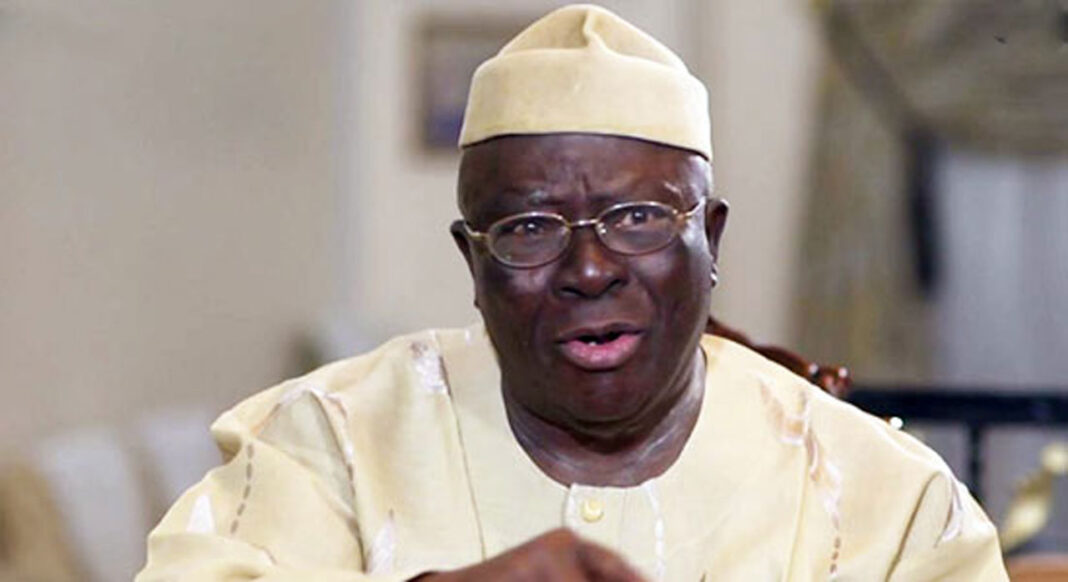By Sam Omatseye
Adebanjo may occupy the office, the soul, however, has abandoned him. The soul was present in the big names that went to Akure. He was invited but he “missed” his flight.
Recently when I think of Ayo Adebanjo, I remember Ernest Hemmingway’s novella, The Old Man and the Sea. It is a small but resonant epic. But it is a story that the Nobel Prize winner who died a suicide compels biographers to see as his self-portrait.
When French hero and leader Charles De Gaulle stepped into his twilight, he recalled Hemmingway’s masterpiece and wondered whether he (de Gaulle) was not an old man who had only a skeleton to tell his sojourn on earth. I am beginning to view the old man of Yoruba politics in that light. Grouchy Adebanjo may be the old fisherman in the tale who caught a big fish in the rough and tumble of the high seas but only arrived home with a skeleton. A shark had made a mincemeat of his great catch. He may end up like King Lear, who earned no love from his three daughters and no love for himself and went into that “good night” a loner.
Many who follow his geriatric path must know that this man’s grouse did not begin with his endorsement of the Labour Party candidate. The endorsement is not an act of defiance. It is a symptom of a pathology. You can call it the contrarian syndrome. A man who must play spoiler in order to attract attention. His is an enterprise as stormy petrel. He is the public desperado banging his shoes to gain attention.
Adebanjo has been with the Yoruba political establishment since the days of the great sage Awo. Awo had many with him since he set up the Action group. Sklar and other scholars who wrote of Awo and his associates noted that the man put together a variegated pool. Some on the right, some on the left, some vibrant, others with slow, burning elan, others with the passion of an undercurrent. But Awo, who would leave a legacy of a man of inflexible principle, managed to hug every hog and wine with the swine. It was an early avuncular virtue to create a big tent for his people. He paid for it later with some of the so-called big men looking the other way, one of them was a mensch for the bench, the great Rotimi Williams. Maybe when we shall write a work on the sage, his capacity for rigidity may be traced to his sense of the futility of embracing the opportunists. He may have read Henry David Thoreau, who was Gandhi’s and Luther King’s John the Baptist as an apostle of non-violence. But Thoreau’s relevant point here was when he said, “I am not a joiner.” Why? Because it is like a pig that enters “a sty in order to feel warm.”
Men like Olaniwun Ajayi and Adebanjo survived because the party provided for him a home, a platform but, for most part, a career. And what a career it has been. But he never fought a good fight. Fighting a good fight is not part of the career. Adebanjo would rather fight an inconclusive fight. It provides a pretext to fight again, and that fuels the career. It allows you to hope for another day. The career is not about an ideological win. It is not about principle, except the principal thing is profit. It is all about the tension. With each battle, the career has hope.
In his book, Participations, Chief Bisi Akande calls him “organising secretary,” a euphemism for a party hustler. Recently, Chief Segun Osoba lashed out at him in quite the same strain. He unveils him as an electoral coward who would stalk in the shadows while others fight in an election. He is not one to test his mettle in a poll. He has no stern stuff for that. He has no grassroots credibility. He has no organising skill. But he is an expert heckler, a serial complainant, querulous and quarrelsome, skating, baying, baiting and hating. As an old man you expect him to mellow. Rather he bellows. He is no Isocrates who warned Greece before it fell. Or the blind prophet in Sophocle’s plays who restrains kings. He is bitter and swaggers in it.
But he is a schemer, too. When the group was in its tested hour, he was seen to work as a fifth columnist. No better evidence than one of the Afenifere’s best, the man Bola Ige. What this essayist wrote here on July 4, bears rehashing:
“When Chief Bisi Akande wrote is memoirs, My Participation, parts of it raked up dust, and this essayist called it the book of the year. One of the storms derived from his claim that Chief Bola Ige tarred both Ayo Adebanjo and Olaniwun Ajayi as traitors at the home of Chief Obafemi Awolowo. Adebanjo and his followers went to town to call Baba Akande a liar. I was one of the few who stuck to the elder statesman’s veracity. A confirmation has come from an unlikely source. In his new memoirs, The Road Never Forgets, Dr. Yemi Ogunbiyi writes that he and his wife, Sade, were witnesses to the event, and he recounts in vivid and dramatic detail what happened during a dinner at the chief’s Ikenne residence.
Ige had just left jail, and paid a visit to Awo. Awo asked him to join them for dinner when he sighted both men. “Uncle Bola looked across the table, and as he sighted some of the seated guests… he stiffened himself up in anger and refused the offer of a seat from Chief Awolowo…he bellowed and screamed relentlessly! “My Leader, I would not sit down with you for dinner with these (pointing across the table) traitors! No. I would not do that. These are traitors, My Leader. They should not be here with you.” The words exploded on and on in the book. Although Ogunbiyi does not name them, he does not deny it was them on my television interview. Adebanjo, over to you chief.”
Indeed, when he complained about the Yoruba chieftains praying for endorsing Asiwaju Bola Tinubu, it was that same syndrome at play. He had been ignored. He was miffed. He probably wanted someone to knock on his door and say, Baba, let us talk. He looked out his window when a fly buzzed or a dog whined. But no human conciliator.
He wanted to exploit his acting position. He is like the fellow known as Ellsworth Toohey in Ayn Rand’s work, The Fountainhead. Toohey has been ignored forever by Roark, another character, who would not look his way. So, he approaches Roark and asks, “Why don’t you tell me what you think about me?” and Roark replies, “But I don’t think about you.”
So, he thinks he can carry the Yoruba race because he is the acting head. And Fasoranti and the big wigs of the race just told him, Adebanjo may occupy the office, the soul, however, has abandoned him. The soul was present in the big names that went to Akure. He was invited but he “missed” his flight.
He started shouting like a kid, and saying he is still Afenifere leader. A leader does not yell. The tiger was shouting its tigritude. Paul did not need to show Peter the chief of the apostles. You don’t grab a leadership, you earn it. Awo never had to tell anyone his status in the land.
But Adebanjo needs such vanity. He also has a delusion of grandeur of raising his spat with the elders to the status of a family feud. He has shown himself a nonagenarian but not an elder. Maybe he sees himself in the fights of such families like the Italians Nicoletti versus Castellani, who duelled for generations. Or the one told by Mark Twain in his Huckleberry Finn between the families Grangerfords and Sherpherdsons.
Adebanjo should know he is not so important. Neither is his endorsement.




